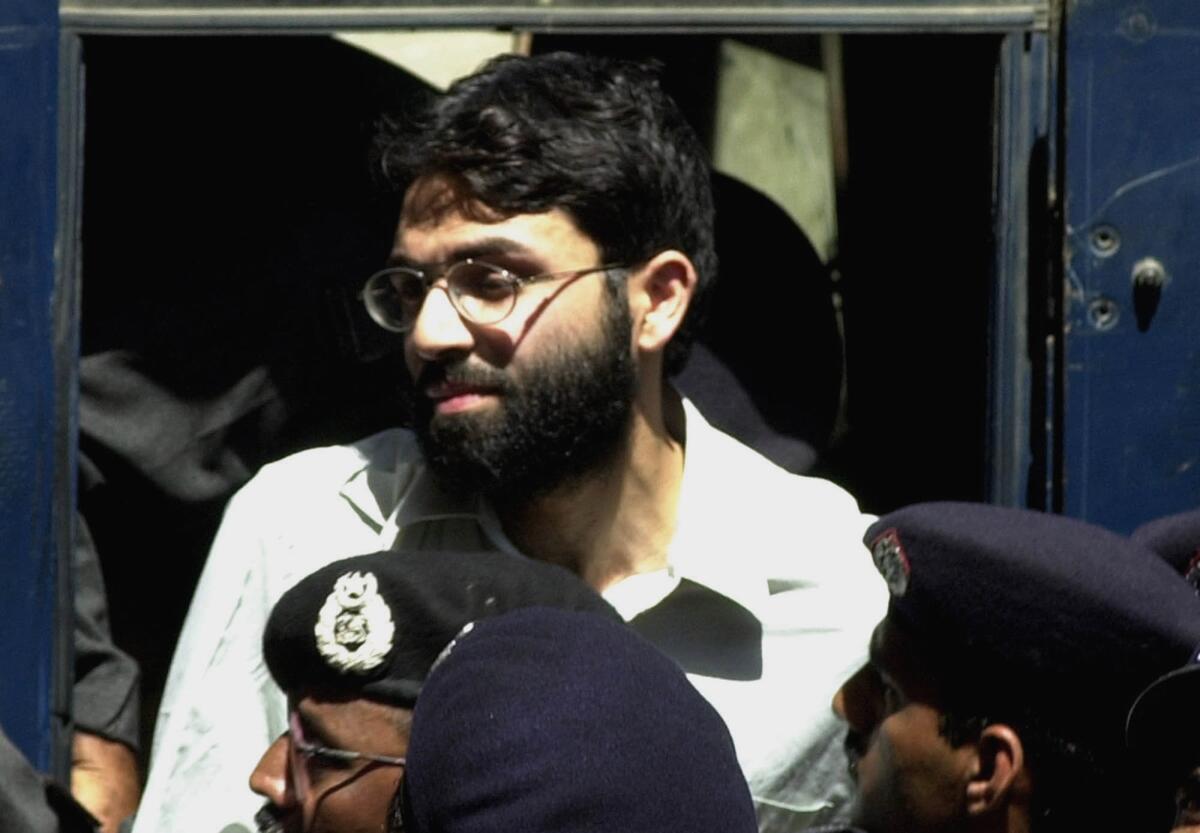Pakistan’s high court accepts appeal by Daniel Pearl’s family

- Share via
ISLAMABAD, Pakistan — Pakistan’s Supreme Court on Monday accepted an appeal by the family of slain Wall Street Journal reporter Daniel Pearl to keep a British-born Pakistani man on death row over Pearl’s kidnapping and beheading.
The court delayed until next week a hearing on an appeal of a lower court’s surprise decision in April to throw out the 2002 conviction of Ahmed Omar Saeed Sheikh over Pearl’s killing.
Sheikh had been found guilty of helping lure Pearl to a meeting in the southern Pakistani port city of Karachi, where he was abducted. At the time, Pearl was investigating a link between Pakistani militants and Richard C. Reid, the man dubbed the “Shoe Bomber” after he tried to blow up a flight from Paris to Miami with explosives hidden in his footwear.
The lower court’s ruling acquitted Sheikh and three accomplices who had been sentenced to life in jail for their role in the plot. The lower court found Sheikh guilty on a single lesser charge of abduction, which he is also appealing.
The acquittal stunned the U.S. government, Pearl’s family and journalism advocacy groups.
It “felt like a thunderstorm that is about to reopen our pains of 2002,” Pearl’s father, Judea, told the Associated Press in an email Monday. “Pakistan’s judicial system caved to either inside or outside pressure to send a message of impunity to extremist elements worldwide.”
The Pearl family’s lawyer, Faisal Siddiqi, said after Monday’s court hearing that there was “ample evidence” to overturn Sheikh’s appeal and return him to death row.
“There is eyewitness evidence, there is forensic evidence, there are confessional statements,” Siddiqi said.
Among the confessional statements is a handwritten letter by Sheikh dated July 19, 2019, that acknowledges his involvement in Pearl’s killing, Siddiqi said. In the letter, Sheikh said his involvement in Pearl’s death was “a relatively minor one.” However, Siddiqi said Sheikh implicated himself in Pearl’s killing with that admission.
Sheikh’s lawyer, Mahmood Shaikh, told the AP that he suffered a heart attack while arguing the case in the lower court, but remained confident that the acquittal would stand.
“I have no doubt in my mind,” Shaikh said. He said his doctors ordered him to remain on bed rest for the next two weeks, throwing into question whether the Supreme Court hearing will happen next week.
The Sindh provincial government also is appealing Sheikh’s acquittal.
Pearl, 38, of Los Angeles, was abducted Jan. 23, 2002. In Sheikh’s original trial, emails between Sheikh and Pearl presented in court showed that Sheikh gained Pearl’s confidence through the two men’s common experience of awaiting the birth of their first child. Pearl’s wife, Marianne, gave birth to a son, Adam, in May 2002.
Evidence entered into court accused Sheikh of luring Pearl to his death, giving the American journalist a false sense of security as he promised to introduce him to a cleric with militant links.
Breaking News
Get breaking news, investigations, analysis and more signature journalism from the Los Angeles Times in your inbox.
You may occasionally receive promotional content from the Los Angeles Times.
Pakistani police sought to locate Pearl for weeks until a video received by U.S. diplomats showed his beheading.
The 2019 letter by Sheikh was not among the evidence heard by the lower court in April.
“The 2019 letter is only one [piece of] evidence to something that we knew all along, without any doubt, that Sheikh lured Danny into the abduction trap which led to his murder,” Judea Pearl said. “We had copies of a long email exchange he had with Danny, using a pseudonym ‘Bashir,’ ... which was downloaded from Danny’s computer.”
An investigation by students at Georgetown University implicated Khalid Sheikh Mohammed, the alleged mastermind of the 9/11 terrorist attacks, in Pearl’s death. Mohammed has been in U.S. custody on Guantanamo Bay since his arrest in Pakistan in March 2003.
Pearl’s father said he has received assurances from the U.S. State Department that it was closely following Sheikh’s acquittal and subsequent appeals. The trial’s outcome could impact relations between the two countries and again paint Pakistan as a haven for militants and extremists, he said.
The U.S. Embassy in Islamabad did not immediately respond to a request for comment.
More to Read
Sign up for Essential California
The most important California stories and recommendations in your inbox every morning.
You may occasionally receive promotional content from the Los Angeles Times.













